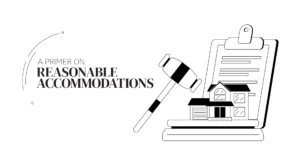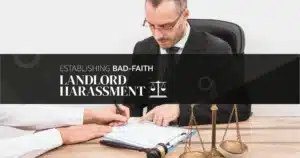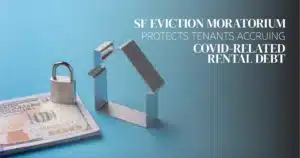Imagine you’re boiling pasta. Then—click click—you hear footsteps. You peek out. Lights dim. You freeze. Is it your landlord?
You dash to the door. It’s open. No knock. No note. Your landlord is in your kitchen. He checks under the sink. Turns water on. You stand there. Scared.
That happened to someone I know—let’s call her Sarah. She stood in her kitchen, confused. No warning. No permission. Just her landlord strolling around like he owned the place. She asked, “Can my landlord just walk into my home like that?”
Good question. The answer: usually no.
This stuff happens more than you’d think. And a lot of renters don’t know their rights.
So, let’s break it down. What your landlord can do. What they can’t. And what to do when things go sideways.
What Are My Tenant Privacy Rights In California?
California law protects your right to quiet and private enjoyment of your home. Your landlord has limits.
Lease Rules Vs. State Law
Sometimes leases say weird stuff like “the landlord can enter anytime.” That’s not okay. California law still applies. State rules override bad lease terms. Always.
Landlords must give you a written notice at least 24 hours in advance. It should say when and why they’re coming.
Valid Reasons to Enter
There are only a few real reasons landlords can come in:
- To make repairs
- To inspect after a move-out notice
- To show the place to new renters or buyers
- If there’s a real emergency
Anything else? Not legal. Curiosity isn’t a reason.
Emergency Exception
Emergencies are different. If there’s a fire, flood, or gas leak, your landlord doesn’t have to wait. They can enter to stop the danger. But the second it’s safe? They’re supposed to leave and tell you what happened.
Real Case: In Duncan v. Kihagi, tenants in San Francisco got over $2.7 million when their landlord entered without notice, harassed them, and ignored privacy laws.
Can A Landlord Enter Without Notice While I’m Not Home?
Still no. Being gone doesn’t change your rights. Your landlord still needs to give notice.
Is Unnoticed Entry Trespassing?
Yes. If your landlord walks in without warning, it’s a trespass. You can report it. You can even take them to court if it keeps happening.
Documenting Violations
Start a log. Write down each entry. Time. Date. What happened? Who was there? Take pictures, save texts, and screenshot messages.
It helps if you need to show proof later. It’s your word plus backup.
Getting Legal Help
Call a tenant attorney. Local legal aid can also help. If it keeps happening, you may have a strong case, especially if they entered more than once without notice.
Recent Example: In May 2025, a California tenant filed a lawsuit after her landlord entered her unit on move-out day without the required 24-hour written notice, despite her being present and objecting. She recorded the video and involved the police. A legal expert confirmed she has “strong grounds” and can seek up to $2,000 per unlawful entry under Civil Code § 1954.
Do Landlords Need Permission To Enter Rental Property?
Yes, they must ask first—unless there’s an emergency.
Consent Counts
Giving permission matters. But it doesn’t have to be forever. Saying yes once doesn’t mean always yes. You control access to your home.
Revoking Permission
You can take your permission back. Send a message saying, “You need to give me notice every time.”
Write it. Save it. And tell them clearly.
Warrant Requirement
If you say no and they still push? They need a court order. Yes, even if they own the place. The law sees it as your space once you rent it.
Case to know: Camara v. Municipal Court set the rule that landlords and officials need warrants to enter if tenants say no.
Can My Landlord Come In Unannounced Legally?
Nope. Not unless there’s an emergency.
Emergency Exception in Detail
Gas leak? Fire? Flooded toilet pouring into your neighbor’s ceiling? Then, yes, they can come in fast.
But they still have to tell you later. And they can’t hang around longer than needed.
“Routine” Isn’t Emergency
Wanting to “check-up” on stuff doesn’t count. Neither does stopping by to say hi. If it’s not urgent or dangerous, your landlord needs notice.
News Report: In February 2025, a Santa Monica landlord was fined $450,000 for entering tenants’ homes without notice and cutting utilities—clear harassment under local law.
How Much Notice Does A Landlord Have To Give Before Entering?
In California: 24 hours. Some cities say more.
Notice Formats
Text, email, or paper—all okay. But it has to be written. A voicemail doesn’t count. Nor does a surprise knock.
Timing Specifics
The clock starts ticking when you get the message. Text at 8 PM? Then, the earliest they enter is 8 PM the next day. Not sooner.
Pro tip: Check your lease and local laws. Some cities require 48 hours.
Is It Illegal For A Landlord To Enter Without Tenant Consent?
Yes. It breaks state law. And possibly criminal law, too.
Criminal Trespass
Some places charge landlords who break in. You can call the police if they do it more than once.
Civil Claims
You can sue for trespass, invasion of privacy, or harassment. You may get money or a court order to make them stop.
Famous Case: Soldal v. Cook County confirmed that property owners can’t enter or remove things without due process.
What Can I Do If My Landlord Keeps Entering My Apartment?
You have options. Big ones.
Step 1: Track Everything
Keep a journal. Save every text. Write down dates and times. Make it clear.
Step 2: Tell Them to Stop
Write a message or letter. “You need to give me 24 hours notice. Stop entering without it.”
Step 3: Get Outside Help
Call a tenant group. File a report with your city. Or reach out to a tenant lawyer. That’s what we do every day.
Can A Landlord Enter For Inspections Without My Consent?
Yes, but only with notice.
Routine Safety Inspections
Allowed if they follow the rules. Landlords must give notice. And they can’t inspect for no reason.
Local Rules
Some cities ask for 48-hour notice or more. San Francisco, Berkeley, and LA have extra protections. Look them up. Know your local laws.
What To Do When the Landlord Violates Your Right To Privacy?
Don’t stay quiet. Act.
Start With a Warning
Maybe it was a mistake. But tell them clearly: “This is not okay. Please follow the law.”
Get Support
Call a housing agency. File a complaint. Talk to someone. Please don’t go through it alone.
Legal Tools
If it keeps happening, go legal. Tenants win these cases often. Judges take privacy seriously.
Can the Landlord Enter During an Emergency Without Notice?
Yes. But only when it’s urgent.
What Qualifies As an Emergency?
Floods. Fires. Gas leaks. Anything that threatens safety or serious damage.
Prove It’s Emergency
Ask questions. Take photos. Check your building. If it wasn’t serious, report it.
Some Frequently Asked Questions
Can my landlord enter without me being home?
No. They still need to give 24-hour written notice, even if you’re not there.
What if my lease says they can enter anytime?
That part of the lease breaks the law. California law always wins over bad lease terms.
Can I change the locks on my apartment?
Only if your lease allows it. If not, ask for permission or talk to a lawyer first.
What can I do if my landlord won’t stop?
Start keeping records. Send a written warning. If they keep coming in, call us. You may be able to sue.
Is calling the police okay?
Yes. If your landlord walks in without notice, it may be a trespass. Call your local non-emergency line.
Does the 24-hour notice apply to weekends and holidays?
Yes. The law doesn’t skip weekends or holidays. If notice comes Friday at noon, entry can happen Saturday at noon.
Can they use “inspections” as an excuse to snoop?
Only if it’s a real, lawful inspection with notice, otherwise, it’s not legal.
Your Space, Your Rules!
So, let’s recap: landlords must give notice, follow the law, and stay out unless there’s an emergency. You have rights. And courts have your back.
If your landlord keeps entering without asking, it’s time to act. You don’t have to handle this alone.
At The Law Firm for Tenant Rights, Inc., we fight for renters every day. If your space feels less like home and more like a hallway, give us a call. Let’s take back your privacy—one locked door at a time.
Reach out today for a free talk. We’re here to help.





